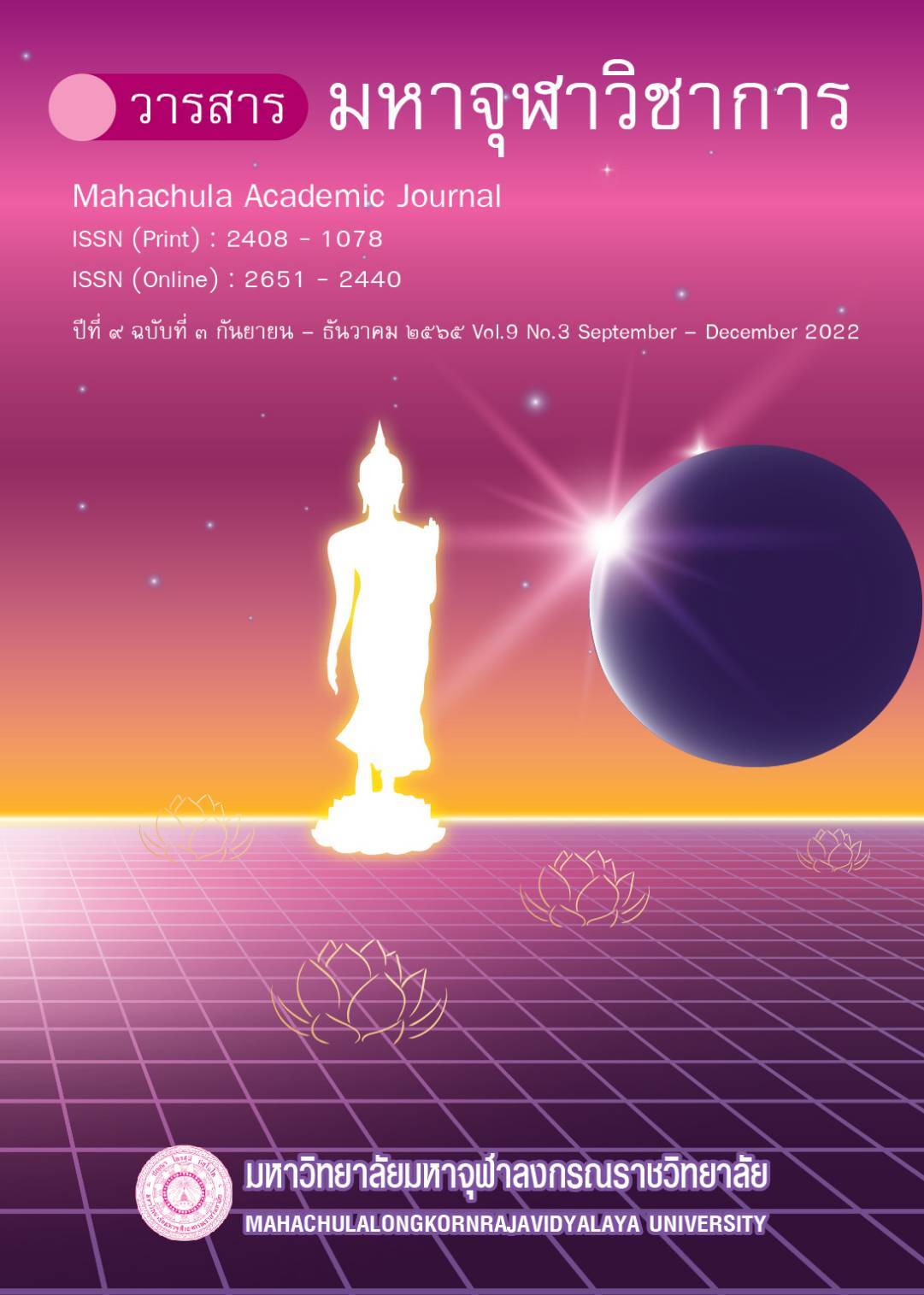The Development of Mathematic Learning Achievement on Single Variable Linear Inequality Using Scaffolding Learning Management of Grade 9 Students
Main Article Content
Abstract
The purpose of this study was to compare the achievement before and after the learning of the students. To examine the conceptual level and the level of satisfaction in learning mathematics in the topics of single-variable linear inequality for grade 9 students. The sample of this study was selected from grade 9 students in the secondary during the second semester of the academic year 2021. The sample being used in this study consisted of 48 students in one class. In this case, the sample was selected through the Cluster Random Sampling method. The data were analyzed by (1) the management plan of mathematical learning, (2) the educational achievement test before and after the learning of the student, (3) the conceptual level assessment, and (4) the satisfaction level assessment form. Statistics used in the data analysis include the median, the standard deviation, and the statistical value t.
The results of the study were as follows: (1) the student’s academic achievement was higher than before due to the use of the learning management plan of scaffolding with the statistical significance at the level of 0.52; (2) the students who received the learning management plan employing the method of scaffolding had a high level of mathematical conception; and (3) the student’s learning satisfaction towards the learning management through the method of scaffolding was at the highest level.
Article Details

This work is licensed under a Creative Commons Attribution-NonCommercial-NoDerivatives 4.0 International License.
References
กระทรวงศึกษาธิการ. หลักสูตรแกนกลางการศึกษาขั้นพื้นฐานพุทธศักราช ๒๕๕๑. กรุงเทพมหานคร: กระทรวงศึกษาธิการ, ๒๕๕๑.
เกวลิน ชัยณรงค์. “การศึกษาสภาพและปัญหาการจัดการเรียนการสอนคณิตศาสตร์ในโรงเรียนมัธยมศึกษา สังกัดสำนักงานคณะกรรมการการศึกษาขั้นพื้นฐาน กรุงเทพมหานคร”. วิทยานิพนธ์ครุศาสตรมหาบัณฑิต. สาขาการศึกษาคณิตศาสตร์ บัณฑิตวิทยาลัย: จุฬาลงกรณ์มหาวิทยาลัย, ๒๕๕๔.
พัชชลัยย์ อนุไชยวงค์ และคณะ. “ความพึงพอใจของนักเรียนต่อการเรียนการสอนวิชาคณิตศาสตร์ที่สอนในโรงเรียนมัธยมศึกษา อำเภอเมือง จังหวัดนครพนม”. วารสารมหาจุฬานาครทรรศน์. ปีที่ ๗ ฉบับที่ ๙ (กันยายน ๒๕๖๓) : ๓๙๔-๔๐๘.
ไพฑูรย์ สินลารัตน์. เติบโตเต็มตามศักยภาพสู่ศตวรรษที่ ๒๑ ของการศึกษาไทย. กรุงเทพมหานคร: มหาวิทยาลัยธุรกิจบัณฑิตย์, ๒๕๕๗.
สรรฐณัฐ ปัญญาเสฏโฐ. “ผลของการจัดกิจกรรมการเรียนรู้คณิตศาสตร์ตามแนวคิดการใช้ปัญหาเป็นหลักและการเสริมต่อการเรียนรู้ที่มีต่อความสามารถในการเชื่อมโยงและการสื่อสารทางคณิตศาสตร์ของนักเรียนระดับชั้นมัธยมศึกษาปีที่ ๒”. วิทยานิพนธ์ครุศาสตรมหาบัณฑิต. สาขาการศึกษาคณิตศาสตร์ บัณฑิตวิทยาลัย: จุฬาลงกรณ์มหาวิทยาลัย, ๒๕๕๘.
สายพิณ ล้ำเลิศ. “ผลของการจัดกิจกรรมการเรียนรู้คณิตศาสตร์โดยใช้กระบวนการ RMT ร่วมกับแนวคิดการเสริมต่อการเรียนรู้ที่มีต่อมโนทัศน์และความสามารถในการแก้ปัญหาทางคณิตศาสตร์ของนักเรียนชั้นมัธยมศึกษาปีที่ ๓”. วิทยานิพนธ์ครุศาสตรมหาบัณฑิต. สาขาการศึกษาคณิตศาสตร์ บัณฑิตวิทยาลัย: จุฬาลงกรณ์มหาวิทยาลัย, ๒๕๕๘.
สำนักงานคณะกรรมการการศึกษาขั้นพื้นฐาน. หลักสูตรแกนกลางพุทธศักราช ๒๕๕๑. กรุงเทพมหานคร: คุรุสภาลาดพร้าว, ๒๕๕๑.
สำนักงานคณะกรรมการการศึกษาแห่งชาติ. “มาตรฐานการศึกษาและตัวบ่งชี้เพื่อการประเมินคุณภาพภายนอก: ระดับการศึกษาขั้นพื้นฐาน ฉบับปรับปรุง พ.ศ. ๒๕๔๗”. จุลสารประกันคุณภาพการศึกษา. ปีที่ ๓ ฉบับที่ ๙ (กุมภาพันธ์ - มีนาคม ๒๕๔๗): ๘.
หทัยรัตน์ ยศแผ่น. “ผลของการจัดกิจกรรมการเรียนรู้คณิตศาสตร์โดยใช้กลวิธีการเสริมต่อการเรียนรู้ที่มีต่อมโนทัศน์และความสามารถในการสื่อสารทางคณิตศาสตร์ของนักเรียนมัธยมศึกษาปีที่ ๒”. วิทยานิพนธ์ครุศาสตรมหาบัณฑิต. สาขาการศึกษาคณิตศาสตร์ บัณฑิตวิทยาลัย: จุฬาลงกรณ์มหาวิทยาลัย, ๒๕๕๖.
อัมพร ม้าคนอง. ทักษะกระบวนการทางคณิตศาสตร์: การพัฒนาเพื่อพัฒนาการ. กรุงเทพมหานคร: โรงพิมพ์แห่งจุฬาลงกรณ์มหาวิทยาลัย, ๒๕๕๓.
Amiripour, Amir-Mofidi and Shahvarani. “Scaffolding as effective method for mathematical learning”. Indian Journal of Science and Technology. Vol. 5 No. 9 (September 2012): 1-4.
Kajamies. “Instructing Low-Achievers in Mathematical Word Problem Solving”. Scandinavian Journal of Educational Research. Vol 54 No 4 (August 2010): 335-355.
Vygotsky, L. Mind in society: The developmental of higher psychological process. Cambridge: Harvard University Press, 1978.
สถาบันทดสอบทางการศึกษาแห่งชาติ. คู่มือการจัดการทดสอบทางการศึกษาระดับชาติขั้นพื้นฐาน (O-NET) ศูนย์สอบ. [ออนไลน์]. แหล่งที่มา : www.niets.or.th, [๑๖ พฤษภาคม ๒๕๖๔].


